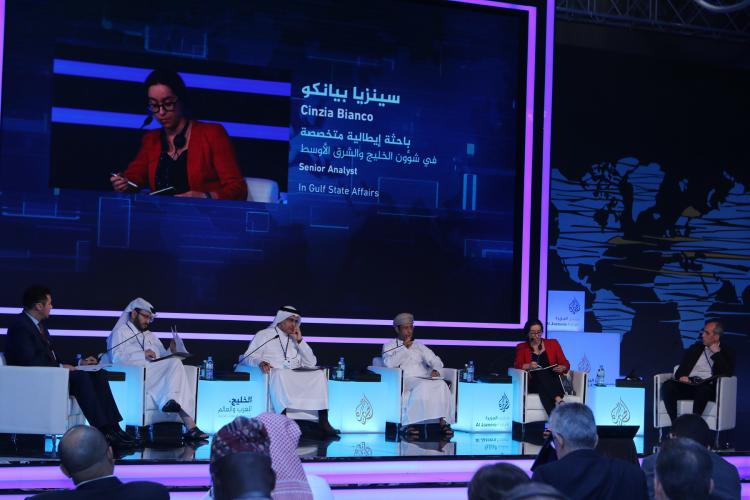
The first day of the 12th Al Jazeera Forum kicked off with the first session, entitled “A year after the start of the Gulf crisis: outcomes and potential courses”. The session featured Dr Majed Al Ansari, Professor of Political Sociology at Qatar University; Dr Faisal Abu Sulaib, Associate Professor of Political Science at Kuwait University; Dr Abdulla Al Ghailani, Professor of Social Sciences at Oman Medical College; Cinzia Bianco, Senior Analyst at Gulf State Analytics; and Mohamed Si Bachir, Professor of Political Science at the L'Ecole Nationale Supérieure de Sciences Politiques.
The speakers discussed the outcomes and consequences of the Gulf crisis, which has now almost entered its second year, and the concomitant measures and policies that put the Gulf unity and the region’s security at stake.
Dr Majed Al Ansari spoke about the implications of this crisis at the regional level, and started by saying that everyone prospected the collapse of the GCC owing to the crisis. However, the GCC has not collapsed, said Dr Al Ansari, “because it did not have any influential political role to start with, yet it will remain the hope of the Gulf peoples in the future.” Al Ansari explained that, since day one, the crisis was not limited to mere differences between rulers or regimes; rather, its impact has extended to the relations among the Gulf peoples. He noted that this is serious in the sense that such relations are relied on for the survival of the GCC as a future investment for the coming generations.
For his part, Dr Faisal Abu Sulaib drew attention to the emergence of a Saudi-UAE influence on US decision-makers and the ideological vulnerability of Donald Trump's Administration, taking into consideration the financial aspect in dealing with the region’s issues. He added that the US Administration knows what it wants from the Gulf States, which in turn know what they need from the United States.
"Today we are faced with demands that are no longer convincing,” said Dr Abdulla Al Ghailani, “The crisis at its root level is not new. It has historical evidence, such as assisting the attempted coup against the Qatari regime in 1996. There has always been an attack on Qatari sovereignty".
On the other hand, Cinzia Bianco said that the European Union sees the Gulf crisis as a very strong setback. She pointed out that despite the EU consensus that this crisis has adverse effects, the ability to influence and push for a solution is no longer certain, as the European countries have to adapt to a number of diplomatic aspects before adopting a more prominent role vis-à-vis the crisis.
The last word, by Dr Mohamed Si Bachir, warned that the GCC may face the same fate as the Maghreb Union and would eventually become an ineffective and even non-existent entity. Dr Bachir drew a comparison between the Maghreb Union experience and that of the GCC, maintaining that the Maghreb Union was born dead, and that the GCC countries should draw lessons from this experience so as not to meet the same fate.

